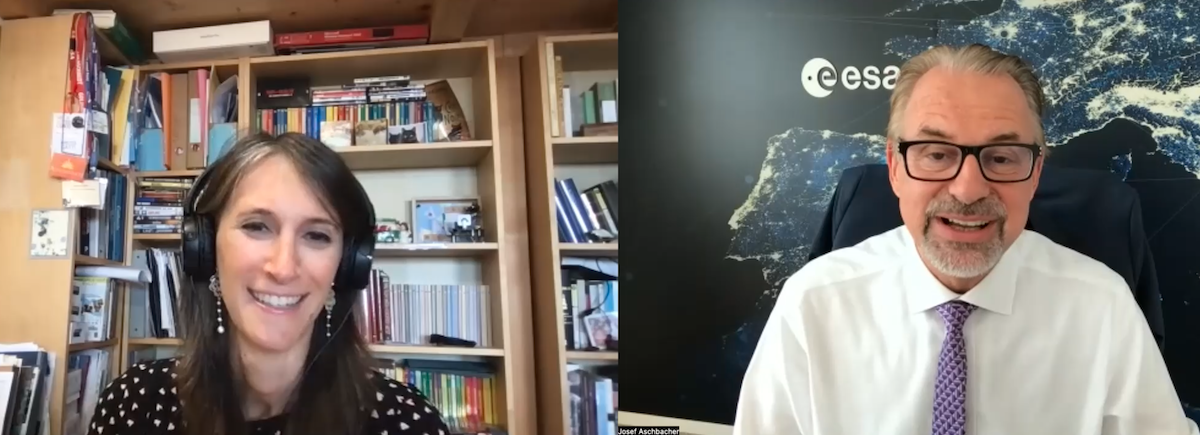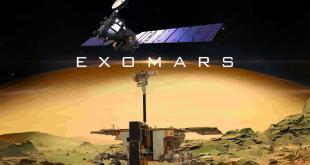Our Space Café “33 minutes with Dr. Josef Aschbacher” – European Space Ambitions – ESA Agenda 2025, updates and goals took place on the 7th of July 2023. Josef Aschbacher earned both his Master’s degree and PhD in natural sciences from the University of Innsbruck. His impressive international career in the space sector spans over 35 years and encompasses work at the European Space Agency (ESA), the European Commission, the Austrian Space Agency, the Asian Institute of Technology, and the University of Innsbruck. In 2016, he ascended to the role of ESA Director of Earth Observation Programmes. Since March 2021, Aschbacher has been fulfilling his duties as the ESA’s Director General.
Earth Observations from Space
More than half of the essential climate variables, defined by the global climate observing system, are coming from space. This includes observations of concentrations of CO2, sea surface temperature, sea level rises, and the state of ice caps on the North and South Pole. ‘It is fair to say that without space observations, or observation served with Earth observation satellites, you would not know the state of our climate to the extent we know it today’ says Aschbacher. More than 80% of the observations needed for meteorology, for weather forecasts, come from satellites.
If you’re not using space in your company, you may actually miss out and you may not be ready for the future
Digital Twin
By using artificial intelligence, modern computing capabilities, and observations we can create a digital twin of our planet, or certain parts of our planet to simulate a situation. Aschbacher has asked his team at ESA to simulate and develop a digital twin of Austria because they have a very good data centre of ground-based observations which can use space data on top. From here they can ask many different questions such as what does it mean if you put windmills in a certain location? How far away should they be from populated areas, what parts of the landscape are important: the height, the slope, and, the orientation. By examining many different parameters they can translate the results into action for industry to invest or for policymakers to consider.
Space in business
Aschbacher has spoken to the CEO of McKinsey who has discussed with CEOs in Shanghai, United Arab Emirates, Europe and America finding that they are reporting that space is one of the future technologies that you have to invest in for a company to be successful. ‘If you’re not using space in your company, you may actually miss out and you may not be ready for the future’. Space should be considered as one of the elements where you business can go by considering using information or testing technology that can be done in space.
Vision for the Moon
The Moon is a focus for upcoming space activities, with many missions planned over the coming decade. Aschbacher is clear to highlight ‘one element is not on our horizon, which is using the Moon as a dumping ground.’ Instead, for ESA, the Moon is of interest for many aspects driven by curiosity, research and technology. When we go to the Moon ESA intends to set up a base or infrastructure.
It is fair to say that without space observations you would not know the state of our climate to the extent we know it today.
There is a project that started in November last year called Moonlight, where ‘we are preparing a network of satellites around the Moon that will offer telecommunication and navigation on the Moon’s surface’. Just like on Earth, people will need to be able to communicate between different points. It is expected that in the future, for telecommunication and navigation, that when the service is established and running there will be users who buy it and use it for their exploration activities. ‘And our objective as ESA is really to do all the exploratory part, the research of the technology development to get there, but also the establishment of infrastructure.’
Europe’s competitiveness
Europe spends 1/15 of the funding that the United States spends for NASA. However, Aschbacher talks about the domains where Europe is very successful. Europe is competitive in Earth observation with the Copernicus and Earth Explorers missions, as well as navigation, with Galileo providing the most accurate signal in the world. In terms of Space Science, Europe is competitive with science research and technology, for example the Euclid telescope or the JUICE mission to look at icy moons. Europe is also a strong partner of NASA on the Artemis mission, the European Service Module, and various other projects.
Aschbacher highlighted that there are domains where Europe is not on the same level, for example human spaceflight. ‘If we talk about human spaceflight, I will say in the ranks of number four, number five, roughly while in other domains with observation, navigation, space science, we are certainly equal with the other major countries so US and China.’ In order to maintain Europe’s competitiveness, united Europe in terms of countries and capabilities is important.
To listen to the Space Café WebTalk’s insights, you can watch the full program here:






